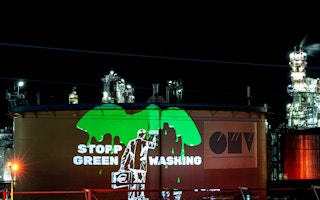Having pressured South Korean oil giant SK E&S into retracting claims it would produce carbon-free gas, ex-fossil fuel lawyer turned climate advocate Jihyeon Ha now wants tougher action against corporates in a greenwashing crackdown in Asia-Pacific.
South Korea in January became the first nation in East Asia to draft a law that would fine firms for false or exaggerated green claims, as companies in the region face more scrutiny over their environmental credentials and net-zero emissions pledges.
This followed a landmark lawsuit in 2021 by advocacy group Solutions for Our Climate (SFOC) - where Ha is head of legal operations - accusing SK E&S of greenwashing after the oil major said it would produce “CO2-free” liquefied natural gas (LNG).
In March 2022, South Korea’s environment ministry warned SK E&S that it needed to base its claims on facts, and the company ultimately changed the wording on its website to say the Barossa gas project off Australia’s northern coast was “low-carbon”.
“Massive gas projects will have serious, irreversible impacts on the climate, contrary to their ‘CO2-free’ claims,” 35-year-old Ha said in an interview.
“Green fossil fuels are a myth and an oxymoron,” added Ha, who was previously legal counsel for S-Oil, a major refiner.
SK E&S did not respond to requests for comment.
“
Massive gas projects will have serious, irreversible impacts on the climate, contrary to their ‘CO2-free’ claims. Green fossil fuels are a myth and an oxymoron.
Jihyeon Ha, head of legal operations, Solutions for Our Climate
South Korea’s draft greenwashing law - which includes fines of up to US$2,300 - is expected to be passed in the first half of 2023, a spokeswoman for the environment ministry told Context.
Ha said that while the fines are small, the bill signalled a major shift in approach from the government, with regulators having only previously tackled greenwashing by giving “administrative guidance” to oil refiners and steel giants.
“Just as regulating tobacco adverts stopped misleading consumers, the same kind of regulation with the right sanctions will prevent greenwashing,” she said. “To achieve net zero by 2050, business practices cannot remain the same.”
Globally, greenwashing is in the spotlight, with UN experts issuing a warning at last year’s COP27 climate summit about its prevalence, and new standards on environmental, social and governance (ESG) credentials currently under consideration by an international body.
In Asia-Pacific, where research shows growing ESG investment and public appetite for environmentally-friendly products, an Australian regulator has launched its first greenwashing case against a pension fund, while Hong Kong and Singapore are vying to be the region’s green finance hubs with stricter ESG rules.
“Efforts to tackle greenwashing are not just happening in the US and Europe - some Asian countries may actually be moving faster than the US,” said Kathlyn Collins, vice president and head of ESG at investment firm Matthews Asia.
Patchwork of corporate disclosure standards
Trillions of dollars have been poured into funds touting their green credentials via various voluntary disclosures as the world economy seeks to accelerate its low-carbon transition.
More than 90 nations, representing an estimated 80 per cent of global emissions, have pledges that commit to reaching net zero, according to the World Resources Institute (WRI), a think tank.
Despite growing global momentum to curb greenwashing, financial and green analysts say the fact there are several ESG and sustainability standards mean that even defining the problem, let alone finding consensus on it, is difficult.
The European Union and the US have drafted respective corporate disclosure rules, and the G20-backed International Sustainability Standards Board (ISSB) in February announced it would support two sets of rules - one on climate and one on sustainability - to form a “global baseline” beginning in 2024.
Governments will ultimately decide whether to make the standards mandatory, but ESG analysts said this could compel - and incentivise - companies to put climate at the core of their operations, and signal that greenwashing will not go unchecked.
“Companies can’t go out and say my product is sustainable, fully recyclable and climate-friendly. The label they put on it needs to be controlled carefully,” said Inna Amesheva, director of ESG regulatory research at sustainability data firm ESG Book.
This also applies to banks and asset managers, she added.
“If I’m marketing a climate fund or a climate ETF (exchange traded fund), I need to be able to justify that methodology, rather than a business-as-usual product.”
A recent high-profile and first-of-its-kind example involved pension fund Mercer Superannuation, which was sued in February by Australia’s corporate regulator for alleged greenwashing regarding the sustainability of seven of its investment options.
The Australian Securities and Investments Commission (ASIC) said these “Sustainable Plus” options were marketed as fossil fuel-free but in fact had holdings in several companies extracting or selling carbon-intensive fossil fuels.
A Mercer spokesperson said it has cooperated with the ASIC but could not comment further because of the court action.
In a separate development, the Australian Competition and Consumer Commission last month said an online review of 247 companies over potential greenwashing found more than half had made “concerning claims” about their environmental credentials.
In a statement, the watchdog said companies were obliged to back up any green or sustainable claims with evidence including reliable scientific reports, transparent supply chain information and reputable third-party certification.










